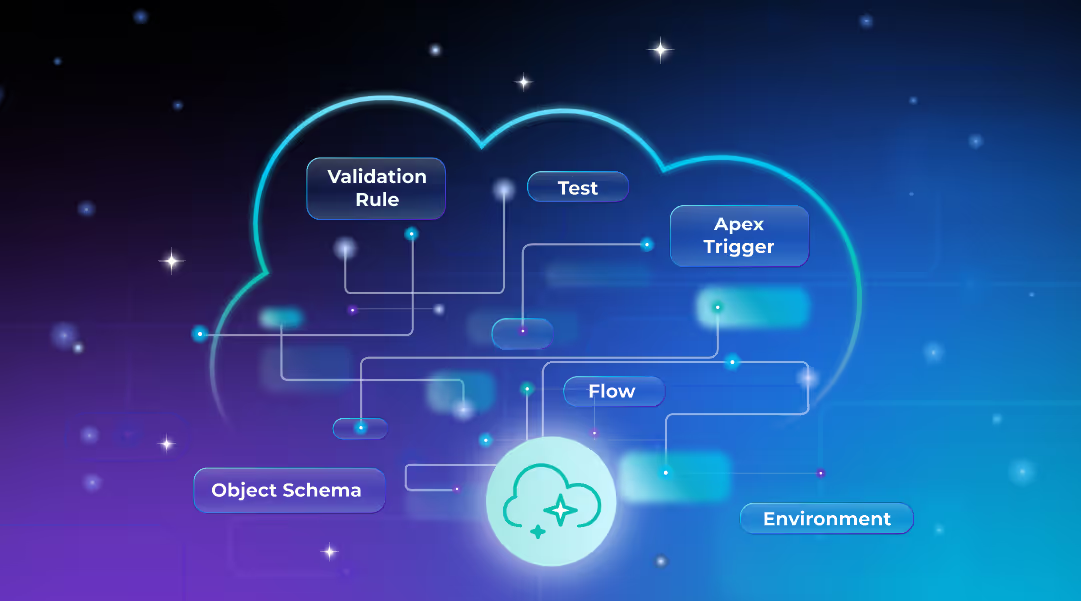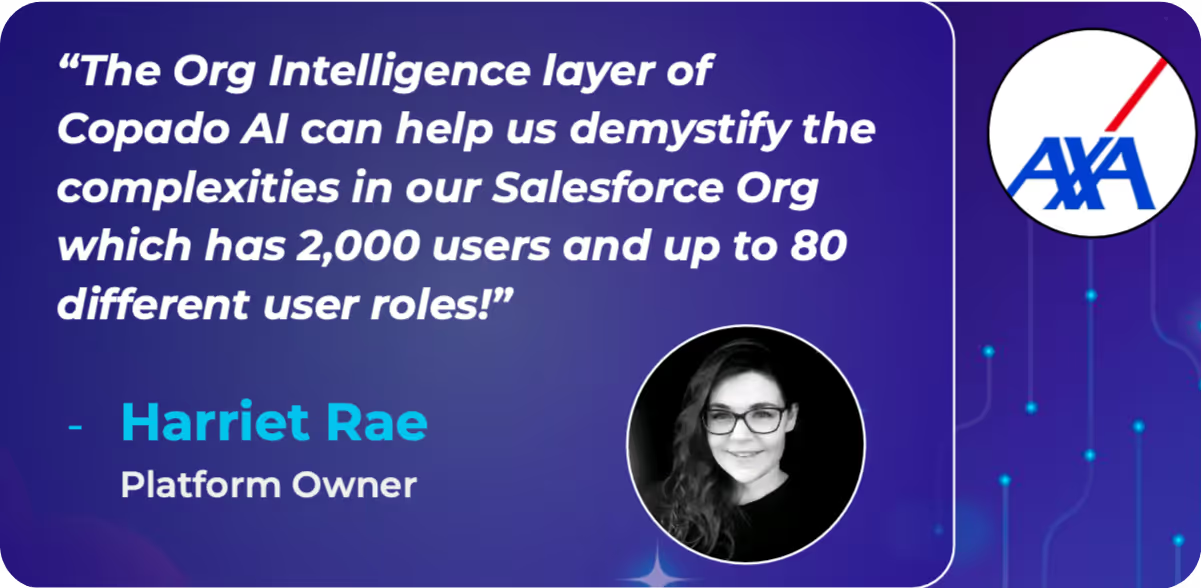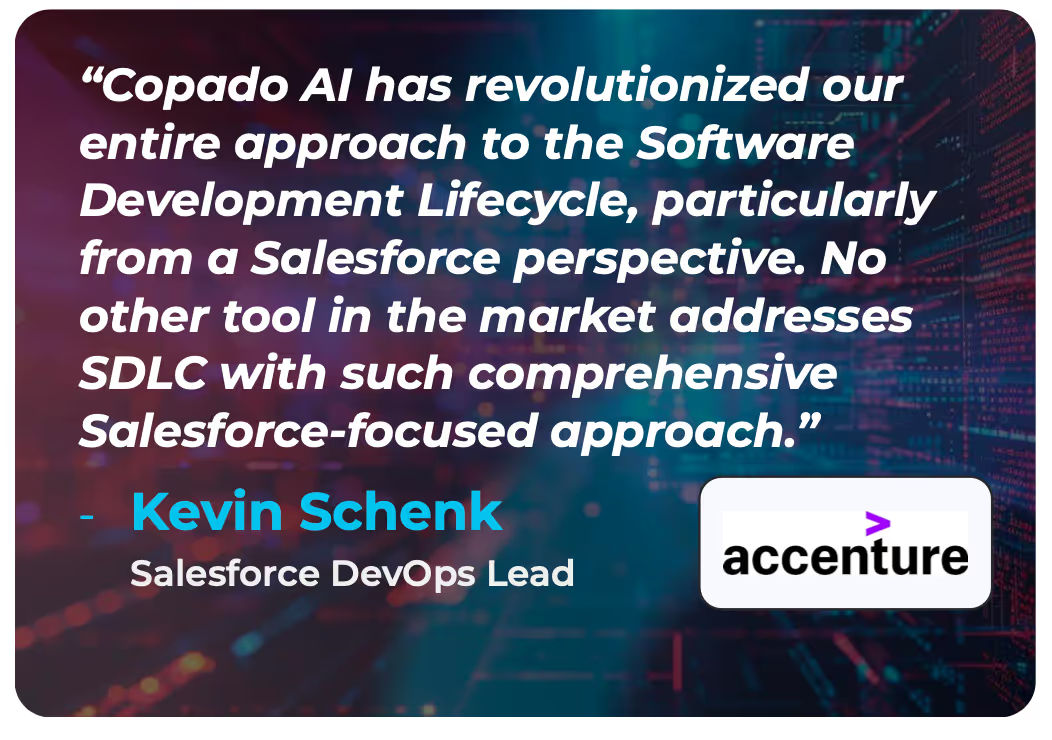

.svg)
.svg)
本当に、あなたのソフトウェア・サプライチェーンは「予期せぬリスク」から守られていると信じられますか?
最新の調査によると、1,500名の経営層のうち約半数が、自社のソフトウェア開発リスクを正確に把握・特定できていないと回答しました。さらに深刻なのは、全体のわずか23%しか、自社環境を明確かつ包括的に把握できていないという事実です。
Salesforce DevOpsチームが直面する現実は、「絵のない1,000ピースのパズル」を解くようなものです。メタデータや設定の全体像が見えないままでは、すべての変更が“勘頼み”。
その結果、わずかな判断ミスが高額な修正コストやリリース遅延、セキュリティホールを生むことになります。
では、解決策は何でしょうか?
答えは Org Intelligence™。
Salesforce環境全体を可視化し、依存関係やリスクを一目で理解できる唯一のツールです。今こそ、「コンテキスト」を軸にしたデジタルトランスフォーメーションへ。
Copado Org Intelligence™ が、チームに確信を持った迅速な変更・デプロイを実現します。
DevOpsにおける「コンテキスト」とは、環境の設定・依存関係・ワークフロー・相互接続といった構成要素を深く理解することを指します。
つまり、より少ないエラーで賢明な意思決定を行い、チーム間の連携を強化するための「全体像」です。このコンテキストを欠くと、チームは勘に頼った作業を繰り返し、重複対応や高コストな手戻りに陥ります。
特にSalesforce DevOpsでは、複雑なメタデータ構造やカスタマイズ、自動化設定が絡み合い、極めて複雑で依存性の高いエコシステムを形成しているため、その影響はより深刻です。
Salesforce特有の多層的な構造は、以下のような重大な課題を生み出します。
Salesforceのローコード開発はスピードをもたらす一方で、メタデータと依存関係の層を増やし、従来のDevOpsツールでは対応しきれない複雑さを生んでいます。
統合的かつリアルタイムなビューがなければ、変更影響の分析は遅く、誤りが生じやすくなり、結果としてリリース品質とスケジュールが大きく損なわれるのです。
Salesforceの組織(Org)は、常に変化し進化し続ける「生きたシステム」です。
2023年版 Salesforce最適化ベンチマークレポート によると、平均的なSalesforce Orgには24,000件以上のメタデータ項目が存在します。
これを手作業で確認すると、4日以上かかる計算です。
さらに、State of Salesforce DevOps Report では、変更失敗率が23%から33%へ上昇し、復旧までの平均時間が2倍に増加していることが明らかになっています。
この背景には、変更管理・デプロイの複雑化という根本的な課題があります。
わずかな変更であっても、Org全体に“波及的な影響”が生じるのがSalesforceの特徴です。一般的なDevOpsツールでは、リアルタイムなメタデータの可視化や依存関係の理解ができず、この複雑性を適切に扱うことができません。
Salesforce専用に設計されたDevOpsツールは、メタデータ、オートメーション、依存関係、アーキテクチャをリアルタイムで可視化し、チームが安全かつ効率的に、スケールを持ってリリースできる「コンテキスト」を提供します。
適切なSalesforce DevOpsツールを活用することで、チームは次のことを実現できます:
汎用的なAIツールは一部のタスク支援には役立ちますが、Salesforce DevOpsのスケールで求められる「コンテキスト理解」「システム統合」「専門性」を欠いています。
その差を埋めるのが、Copado AI Platformの中核機能 ― Org Intelligence™ です。
Org Intelligence™は、Salesforce Orgの隅々までをリアルタイムで可視化します。
メタデータ、オートメーション、ユーザーストーリー、デプロイパイプラインまで、すべての情報を一元化し、チームの“見えない領域”をなくします。
その結果、高品質な変更をより速く、確信を持って届けることが可能になります。従来型のDevOpsツールが依存する「手動のディスカバリー」や「分断されたデータ」と異なり、Org Intelligence™はCopado CI/CD環境とSalesforceメタデータに直接接続。
300種類以上のメタデータタイプ(自動化・データモデル・アプリケーションなど)をサポートしています。
どれほど熟練したSalesforceチームでも、Org全体のコンテキストが欠けると課題は避けられません。依存関係の見落とし、コードの不整合、Org探索の遅延、オンボーディングの停滞、トラブル対応の長期化などが代表例です。
Org Intelligence™は、これらの課題をCopado AI Agentsの連携によって生産性向上へと転換します。
常に最新の状態で、Orgのメタデータ・アーキテクチャ・ユーザーストーリーなどと統合され、生成されるすべてのAI出力(コードスニペットや修正案)が、実際のOrg環境を正確に反映します。
主な機能:
次章では、これらの具体的な成果をさらに掘り下げていきます。
Copado Org Intelligence™ を活用することで得られる、4つの大きな利点をご紹介します。
Copado Org Intelligence™ は、これまで何時間もかかっていた手動調査を、明確なインサイトに変換します。
ビジネスアナリスト、開発者、管理者は、メタデータや自動化の全体像をリアルタイムで直感的に把握可能。視覚的なダイアグラムと詳細な説明により、複雑なOrg構造も一目で理解できます。
すべてがひとつのプラットフォーム上で完結するため、分析と意思決定が圧倒的にスピーディになります。
開発者はもはや、テンプレート的なコードを書いたり、既存Orgとの整合性を勘で判断する必要はありません。
Copado AI が既存のメタデータを参照し、ベストプラクティスに準拠したコードを自動生成。さらにユニットテストも自動的に通過する品質を担保します。
一方で、ビジネスアナリストには要件を正確に反映したユーザーストーリーが提供され、ビジネスチームと技術チームの間に生じがちなギャップを橋渡しします。
このピンポイントなインサイトにより、従来のトラブルシューティングよりも圧倒的に短時間で復旧が可能になります。多くの場合、チームは障害対応から修正版のデプロイ完了までをわずか30分以内で完了できるようになります。
品質プロセスを開発初期段階(Shift Left)に組み込み、Org全体のコンテキストを常に反映させることで、Copadoは再作業を最小化します。
その結果、チームは常に高品質な変更を継続的にリリースでき、従来の「リリース日=緊張の日」を過去のものに変えます。
Copado Org Intelligence™ は、戦略的ゴールを「安全で追跡可能な技術実行」へと変換し、リスクを軽減し、価値実現までの時間を短縮します。
これにより、経営判断や重要な変更も、勘ではなく確信に基づいて実行できるようになります。

これまでにないOrgの可視化により、Salesforce DevOpsチームは、AIが生成するユーザーストーリーやコードを活用して、より高度な自動化を実現できます。
さらに、ビジネスチームと技術チームの間で情報がスムーズに共有され、連携の質とスピードが飛躍的に向上します。

Org Intelligence™ により、繰り返し作業の自動化、デプロイ失敗の削減、問題解決の迅速化が可能になります。
Salesforce開発者や管理者は、よりスマートに構築し、より早い段階でテストし、自信を持ってリリースできるようになります。障害に悩まされる時間が減り、新しい価値創出に集中できる環境を実現します。
Org Intelligence™ の有効化は非常に簡単です。Salesforce OrgをCopado AI Platformに接続するだけで、リアルタイムのメタデータ、オートメーション、ユーザーストーリー、デプロイ状況を1つのダッシュボードで確認できます。
このデータを活用することで、すぐに以下のことが可能になります:
Org Intelligence™ の価値を最大化するためのベストプラクティス:
もはや「コンテキスト」はオプションではありません。それは、複雑なSalesforce環境において、迅速・安全・スケーラブルな変更を実現するための基盤です。
Copado Org Intelligence™ は、AIを直接Orgのメタデータ・自動化・パイプラインに接続し、DevOpsプロセスのあらゆる段階に「文脈理解」を組み込みます。
もう“リリース当日の混乱”は過去の話です。
Orgの文脈を理解したSalesforce DevOpsで、自信ある変革を始めましょう。
コンテキストとは、Salesforce Orgのメタデータ・依存関係・自動化構成を深く理解することを指します。
CopadoのAI Platformのようなツールは、この情報を活用して勘に頼る作業を排除し、エラーを減らし、変更影響分析を高速化することで、安全かつ迅速なリリースを可能にします。
Salesforce Orgは数千のメタデータと複雑な依存関係を持つため、可視性不足・手動レビュー・属人化・遅延対応といった課題が発生します。
Org Intelligence™ はリアルタイムのインサイトを提供し、変更の影響を事前に予測し、正確なユーザーストーリーを生成し、迅速に問題を解決します。
Salesforceのメタデータとデプロイパイプラインに直接統合することで、Org構造の自動把握、ユーザーストーリー生成、問題解決、コード検証を自動化します。
これにより手動作業を削減し、解決までの時間を短縮。再作業も最小限に抑え、より速く、より確実にリリースを実現します。
Explore our DevOps resource library. Level up your Salesforce DevOps skills today.

.avif)


.svg)
